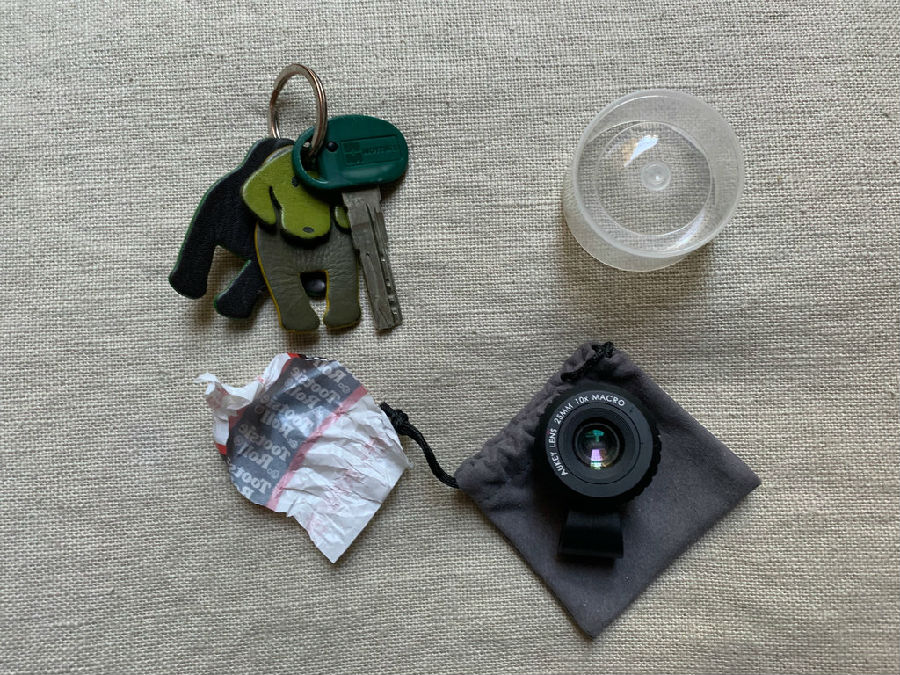Since then, other small objects, including a set of keys, have moved to strange new places inside her apartment.
那以后,公寓里的其他小物品,包括一串鑰匙,也出現(xiàn)在了莫名其妙的地方。
The reappearance of the camera lens in particular struck her as a "mischievous," playful gesture —
在她看來,這一連串的怪事,尤其是相機(jī)鏡頭的失而復(fù)得,彰顯了一種“淘氣”、頑皮的姿態(tài)——
perhaps even a thoughtful suggestion that this could be the perfect time for Ms. Hill,
甚至可能還傳達(dá)了一個體貼的建議:出身電影專業(yè)的她
who majored in film in college, to pick her old hobby back up.
是時候拾起舊時的愛好了。
Kerry Dunlap shares a one-bedroom apartment in the Ridgewood neighborhood of Queens with his girlfriend, Alexandra Cohl.
克里·鄧?yán)蘸团褋啔v山德拉·科爾在皇后區(qū)里奇伍德社區(qū)租了一套一居室。
Mr. Dunlap, a 31-year-old teacher, rapper and concert promoter, believes he first met their resident ghost last summer.
現(xiàn)年31歲的鄧?yán)帐且幻處煟€是說唱歌手,演唱會策劃,在他看來,去年夏天他們就已跟鬼打過照面。
He saw her in the bathroom, in the middle of the night: wearing green scrubs, standing an arm's length away from him.
那天半夜,穿著綠色的手術(shù)服她出現(xiàn)在了他的洗手間,距離他僅一臂之遙。
She appeared to be glowing.
整個人似乎都發(fā)著光。
The woman vanished when he turned on the light.
他剛打開燈,那個女人就消失了。
Mr. Dunlap knew that one of the friends the couple is subleasing from had spotted a ghost in the apartment;
二人是從朋友手里轉(zhuǎn)租的這套公寓,鄧?yán)罩溃俏慌笥岩苍谶@套公寓里看見過鬼;
both agreed they'd seen an older Asian woman of small stature.
他們二人都認(rèn)為自己看到的是一位身材矮小,有一定年齡的亞洲女性。
Mr. Dunlap and Ms. Cohl, a 27-year-old writer and editor,
過去,鄧?yán)蘸团选F(xiàn)年27歲的作家兼編輯科爾常常發(fā)現(xiàn),
used to find themselves in a routine late-night tug of war over the too-small comforter they shared.
他們?nèi)靸深^就會陷入一場深夜拉鋸戰(zhàn),原因是兩人蓋的被子太小了。
Several weeks ago, Mr. Dunlap woke late at night to the sensation of what he assumed
幾周前的一天深夜,鄧?yán)彰悦院杏X有人在理他腳邊的被子,
was Ms. Cohl adjusting the blanket at his feet to spread it evenly across the bed.
似乎是要將被子鋪平整,他以為那個人是女友科爾。
When the movement stopped and he didn't feel his girlfriend climb into bed beside him, he called out to her.
“女友”停止整理被子后,他卻并未感覺到“女友”躺回他身旁,他便喊了喊她。

She didn't answer.
沒有回答。
Then she came back in from the bathroom.
接著,她從洗手間回來了。
"It was so weird, dude," Mr. Dunlap said. "It was so weird."
“太詭異了,兄弟,”鄧?yán)照f。“真的是太詭異了。”
But the incident left him and Ms. Cohl with a lingering positive impression:
不過,這件事給他和科爾留下的卻是正面的印象:
like whoever — or whatever — it was, it had been trying to make the couple feel more comfortable,
不管它是誰,又或者,不管它是什么東西,它都是想讓這對情侶能感覺舒服一點(diǎn),
or to mediate a potential conflict between them before it happened.
也可能是想調(diào)和二人之間的潛在沖突。
Kurt Gray, an associate professor at the University of North Carolina at Chapel Hill,
北卡羅來納大學(xué)教堂山分校副教授庫爾特·格雷研究的就是
studies how we perceive and treat the minds of other entities, including animals, machines and the dead.
我們感知以及對待其他存在,比如動物、機(jī)器、逝者等的思想的方式。
Times of great unease or malaise, when there is an increased drive to find meaning in chaos,
他說,人在極度不安或極度不適的時候格外需要從混亂中尋找有意義的存在,
can lend themselves to perceived hauntings, he said —
這時的確有可能產(chǎn)生被鬼纏身的感覺,
not to mention that disease itself shares certain psychological parallels with a "malevolent spirit,"
更不用說,疾病本身與“惡靈”對人心理的影響就有某種程度的相似之處 ,
creeping invisibly upon its unsuspecting victims.
它們都會不動聲色地爬到毫無戒心的受害者身上。
This phenomenon could also be a side effect of the loneliness of our time.
我們這個時代帶來的孤獨(dú)感也有可能引發(fā)鬧鬼這一現(xiàn)象。
"In quarantine, you are physically confined and also psychologically confined.
“隔離的時候,大家受限的不僅是行動,還有心理。
Your world narrows," Mr. Gray said.
因?yàn)槟愕氖澜缱冃×耍备窭渍f。
"You're trapped at home, you're needing human contact —
“你被困在了家里,但你又需要與他人保持聯(lián)系——
it's comforting to think that there's a supernatural agent here with you."
有一個超自然的存在在陪你,你應(yīng)該感到安慰才對。”
譯文由可可原創(chuàng),僅供學(xué)習(xí)交流使用,未經(jīng)許可請勿轉(zhuǎn)載。











